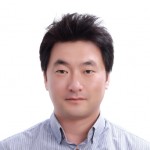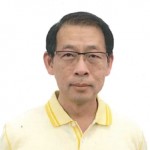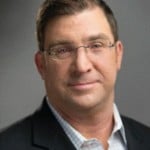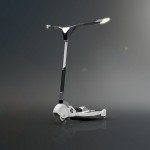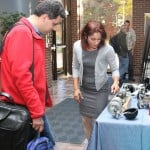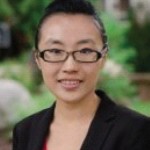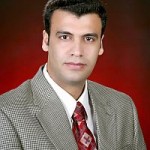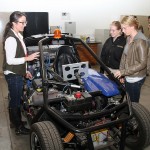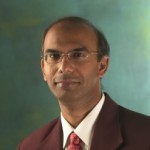 The ME-EM Graduate Seminar speaker on Thursday, October 30th at 4:00 in 103 EERC will be Dr. Ghatu Subhash from the University of Florida, Gainesville.
The ME-EM Graduate Seminar speaker on Thursday, October 30th at 4:00 in 103 EERC will be Dr. Ghatu Subhash from the University of Florida, Gainesville.
The title of his presentation will be ‘Cavitation-Induced Damage in Brain Tissue and Surrogates: Relevance to TBI’.
Traumatic brain injury (TBI) has reached epidemic proportions in US. Around 1.7 million people are diagnosed with TBI each year. While a majority of these injuries are due to physical blows that may occur because of a fall or during an athletic activity, blast-induced mild traumatic brain injury (bmTBI) is specific to soldiers who are exposed to frequent improvised explosive device (IED) blasts in a hostile environment. A blast wave consists of a high pressure front followed by a negative pressure tail. It is commonly believed that only the high pressure front causes significant damage to the brain tissue. In recent years, new evidence has emerged revealing that extensive cavitation indeed occurs in brain tissue due to the negative pressure that immediately follows the high pressure front in the blast wave. The negative pressure initiates cavitation bubbles which collapse and release shock waves, and cause significant local neuronal and astrocyte damage in sensitive areas of the brain. The current research focusses on investigating this specific phenomena in brain tissue and surrogates (e.g., gels). The first goal of this research is to develop an experimental facility to characterize cavitation in a simulated brain environment and measure associated deformation during bubble growth and collapse on a tissue surrogate. The second goal is to quantify the neuronal and astrocyte injury when a brain tissue is exposed to blast waves. A novel experimental facility has been developed to visualize controlled cavitation under high-rate stress wave loading, whose pressure profile mimics that of a blast shock wave, i.e., it contains a high pressure component followed by a negative pressure component. Highly sensitive pressure sensor measures the pressure inside the fluid filled chamber where a single air bubble is introduced at a specified location. Upon arrival of the pressure wave the bubble grows rapidly and collapses. Negative pressure magnitude, which dictates bubble growth rate and its final size, can be controlled. A high speed digital camera with frame rates up to 300,000 per second was employed to capture the tissue deformation characteristics. Digital Image Correlation (DIC) technique was employed on the gel tissue to capture the time varying strain field during the bubble growth, collapse, and subsequent generation of local shock wave. The relationships between the incident pressure, cavitation bubble dynamics, and induced deformation within a tissue surrogate during shock loading are investigated. In the next step, live brain tissue slices extracted from rats were tested with specified areas (e.g. Hippocampus) exposed to single bubble cavitation. Postmortem histological studies have been performed to quantify neuronal and astrocyte damage as a function of shock pressure. Our experiments have shown that the shock-induced cavitation bubble growth and collapse can be captured using this experimental facility and the results indicate that sensitive tissue damage indeed occurs due to the shock wave generated by cavitation bubble collapse.
Professor Subhash obtained his MS and PhD degrees from University of California San Diego and conducted post-doctoral research at California Institute of Technology, Pasadena, CA. He joined the faculty of Michigan Technological University (MTU) in 1993 and then moved to University of Florida (UF) in 2006. He has received numerous awards for excellence in teaching, research and professional service, including the ‘Significant Contribution Award’ American Nuclear Society – Materials Science and Technology Division (2014), Fellow of Society of Experimental Mechanics (2014) ‘Technology Innovator Award’ University of Florida (2014), UF Research Foundation Professor (2013), College of Engineering Teacher/Scholar of the year (2013), ‘2011 Researcher of the Year’ Mechanical and Aerospace Engineering Department, Second Place of the Best paper Awards at the 31st Annual American Ceramic Society meeting (2008), Michigan Tech Distinguished Research Award (2005), ASME Fellow (2004), ASME Student Section Advisor Award (2003), Society of Automotive Engineers (SAE) Ralph R. Teetor Educational Award (2000), American Society of Engineering Education (ASEE) Outstanding New Mechanics Educator Award(1996), and Distinguished Teaching Award at MTU (1994). He is an Associate Editor of Mechanics of Materials, Journal of the American Ceramic Society, Experimental Mechanics and ASME Journal of Engineering Materials and Technology. He has graduated 21 PhD students and is currently advising 12 PhD students in various fields related to processing, microstructural characterization and multiaxial behavior of advanced materials including ceramics, metals, composites, gels and brain tissue. He has authored around 150 peer reviewed journal papers and 70 conference proceedings. He has filed for 8 patent applications in various fields of material processing, mechanical testing, food packaging, and protective helmet design. His recent invention on fluid filled energy absorbing cushions for protective equipment has received widespread attention from major TV networks (Fox , CBS and 40 other local TV channels), and radio stations (including NPR) and articles by Reuters, ASEE morning bell and many local newspapers. He has given numerous invited lectures and seminars at many universities and international conferences.
